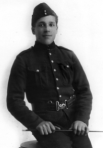 One of the curious things about writing is that we often get to write about dead people.
By that I don't mean the living dead, or vampires (though they take up a lot of fictional space on the shelf), but real human beings who once existed. Who walked in the real world. Who were loved or hated, held or rejected. Our interactions, our love, our frustrations with the people who once breathed the same air as us cannot help but have an influence on our writing. And that influence, that presence, allows us to draw inspiration from them and to honour them (or, if they were not the most pleasant of souls, at least recreate how they walked in the world).
One of the curious things about writing is that we often get to write about dead people.
By that I don't mean the living dead, or vampires (though they take up a lot of fictional space on the shelf), but real human beings who once existed. Who walked in the real world. Who were loved or hated, held or rejected. Our interactions, our love, our frustrations with the people who once breathed the same air as us cannot help but have an influence on our writing. And that influence, that presence, allows us to draw inspiration from them and to honour them (or, if they were not the most pleasant of souls, at least recreate how they walked in the world).When a friend or a family member has lost someone dear one of the kindest gifts we can give is to say the names of the dead. Often something simple will suffice. "I remember how much Tim enjoyed laughing." Or "Shelly had a real knack for finding the right word and the right time." Why is it important to say their names? Because for those few moments for the listener it will feel as if that person is still alive. By saying a name we essentially say, "Yes, he existed--yes, she was here on this earth." It is a way of paying honour. That's why we put names on gravestones. As long as the person is named and not forgotten, in some small way that person still exists.
Writing can be another way of naming the dead. I could not have written Megiddo's Shadow, a world war one novel, without being moved by all the deaths I'd read about in my research. But I drew most of the inspiration from the death of my own great uncle Percy, who was killed a short time before the end of the war. His death still ripples across the shared memories of my family. His photograph is on the wall in my parent's home, beside the letter that was written by his sergeant to say that Percy had been killed in action. We name Percy every Remembrance day. We honour who he was. Obviously I never knew Percy since he died a long time before I was born. But we have spoken his name enough times that he is alive in my family's shared memory. It is that loss, both the imagined and real, that helped compel me to write the novel.
David, my eldest brother, was killed in a car accident in 1980. Though I never want to draw direct lines between real life and my fiction, I do know that the loss that Robert feels when his brother Matthew disappears in Dust is echoed in my experience of loss. As is the loss Edward feels when his brother Hector is killed in Megiddo's Shadow. All of that is echoed. My daughter, Tori, who died in 2008 due to complications from Leukaemia, had Down Syndrome. Her presence in my life had been one of several things that inspired me to create The Hunchback Assignments, a book with a hero who had a handicap. I don't know that I would have been able to approach that story without knowing what her world was like and how the outside world often reacts to those who have a disability. Of course, the book itself is not about her. But as writers we can't help but draw on the knowledge and experience we gain from the real world. And by this I don't mean we have to recreate the person we loved (though I did, for my own purposes, place my own version of my grandfather briefly in Megiddo's Shadow).
Of course, you never want your writing to become a rote story, a lesson to the world. We should always be loyal to the story first. Instead use that knowledge and emotion you've experienced in your loss to make the world of your writing a deeper and richer place. Take that emotion and let it be the engine of the new worlds, new characters you want to create.
We should never be afraid to name the dead.
Art
2 comments:
Really well said...I agree with your suggestion to allow personal grief to inform your writing but not take it over. And I'm very sorry for all of the loss in your life.
~leigh
Thanks, Leigh! I'm so glad the post was helpful!
Post a Comment